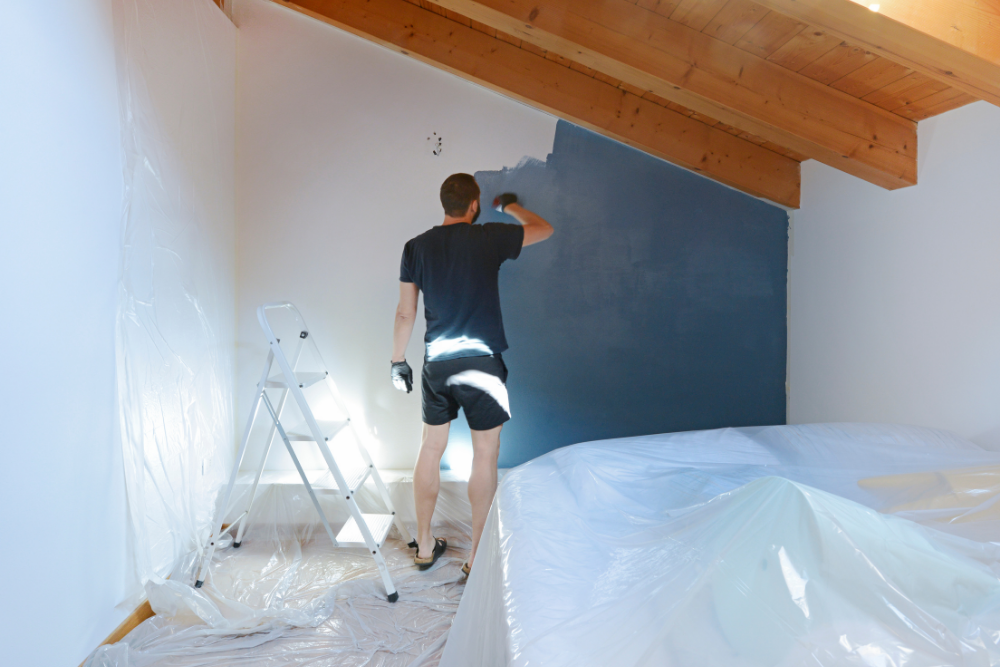When it comes to DIYing, you should always ensure that you know what you’re getting into.
Commercial and residential painting may seem like similar projects, but they’re quite different.
They require different skill sets and tools, with commercial projects often being a lot more extensive and labor-intensive.
That said, commercial and residential painting projects have different requirements, and while one might be easier to DIY than the other, they both present some challenges.
Here are a few of the main factors to consider when deciding on either a commercial painting project or a residential painting project, and whether or not to DIY.
The size of the project
Oftentimes, the scope of the painting project indicates the type of painting service that’s needed.
Residential projects will be relatively smaller than commercial projects, as they will often only include spaces like houses, townhouses, condominiums, and other living spaces that can be painted much quicker.
Commercial painting often focuses on much larger projects, with the types of buildings included in this category ranging from retail shops and shopping malls to industrial buildings and airports—basically, massive buildings.
This means that commercial buildings will often require more painters to cover the area of the building and meet tight deadlines, so DIYing won’t be the optimal choice.
Residential painting projects, in comparison, don’t require as many painters on-site, which means that if you were to DIY, you would be better off attempting residential properties rather than commercial buildings.
The materials needed
When it comes to the materials and equipment you’ll need, residential painting often entails paint supplies that you can get on your own.
These materials will include things like paint brushes, rollers, painting trays, step ladders, drop cloths, and cleaning materials.
Commercial painting, however, requires much broader experience in dealing with a variety of different surfaces like wood, concrete, marble, metal, plastic, and much more.
For commercial spaces, more complex equipment would need to be used, such as pressure washers, sandblasters, paint sprayers, industrial-grade paints, primers, tints, and other specialty coatings.
But remember that even though residential painting might come with tools that you can easily purchase for yourself, it doesn’t guarantee that you’ll know exactly how to use them!
So in terms of both residential and commercial projects, for a painting job well done, it would bode well for you to get the help of a professional painting company, rather than DIYing.
The level of skill necessary
On the topic of professional painters, when it comes to both commercial and residential painting projects, there are many advantages to having experienced painters handle the job.
Residential painters will have the knowledge to guide homeowners in choosing the right colors and the exact type of paint for exterior and interior surfaces.
They will know how to get the job done quickly and efficiently while maintaining a high standard and protecting your furniture and flooring.
That said, there are plenty of instructional guides available on how to paint your home, which means that while it might require a good amount of research, planning, and preparation, it’s possible to DIY—especially when it comes to residential interior painting as it’s one of the most reasonable options to DIY.
Exterior residential painting, however, will often be a lot more challenging to DIY.
Commercial painters will often require more skill and have more concern for safety.
This is often because commercial buildings will be much higher and can be in dangerous locations, which means that the painter will need experience and endurance for this type of job.
So while smaller residential projects might be something that you can consider doing yourself, it’s not advisable to attempt commercial projects.
Also, as the appearance of both the interior and exterior of a commercial building is an essential part of the business’s branding and marketing, a professional painting company would be a better choice.
The risk involved
A residential painting project presents a much smaller risk in comparison to a commercial painting project, which could involve a large working environment, presenting more moving parts and more room error.
In compliance with safety regulations set up by both local and national authorities, strict safety protocols must be followed when carrying out these types of projects.
Painting contractors will often supply their employees with proper safety equipment and the know-how to complete a job safely.
This is why a commercial project should not be undertaken to DIY.
This extends to residential projects too as the bigger the property, the more risk it will hold.
Homes with multiple stories can pose a serious risk to your safety, which is why you should consider hiring a painting contractor for at least the exterior parts of your home.
Residential and commercial painting—best to hire a professional
While it may be tempting to think that you’ll be able to handle big painting projects, it’s often best left to the professionals, as they will know exactly how to get the job done while maintaining a high standard and taking adequate safety measures.
While a residential painting project does not pose as much of a challenge as a commercial project, it may still prove to be a cumbersome task, especially if you have multiple stories to deal with.
It’s always advisable to hire a professional for any big painting projects, with the only generally acceptable DIYing reserved for the interiors of your home.


Recent Comments